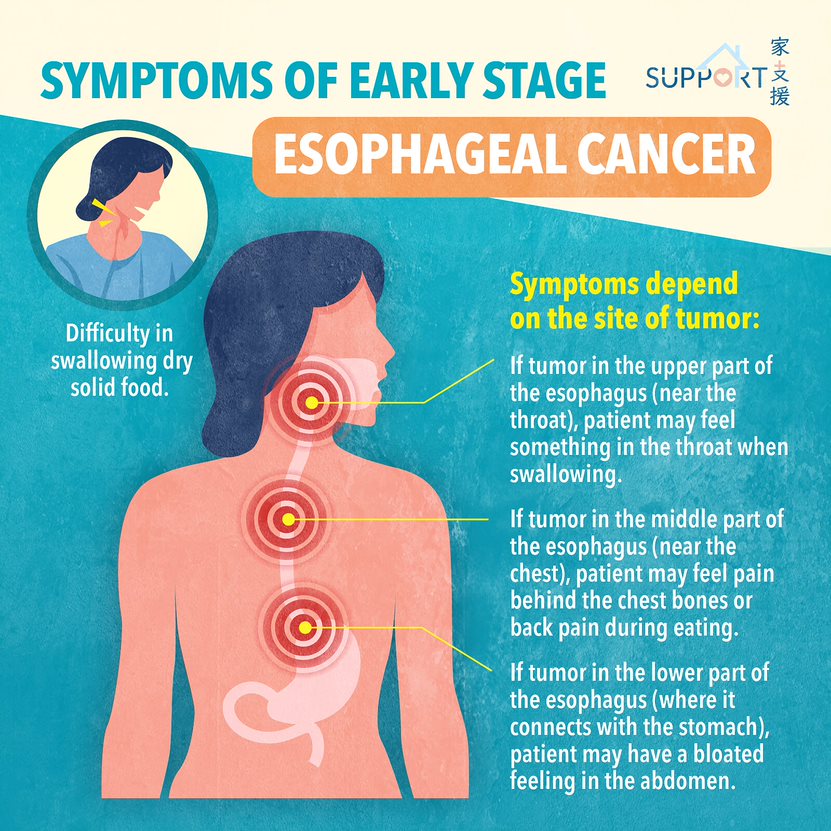What Is Esophageal Cancer What Are The Symptoms A Doctor Explains

Esophageal Cancer Symptoms Causes Complications 59 Off Symptoms of esophageal cancer usually happen when the disease is advanced. signs and symptoms of esophageal cancer include: difficulty swallowing. chest pain, pressure or burning. coughing or hoarseness. weight loss without trying. worsening indigestion or heartburn. Esophageal cancer (esophageal carcinoma) is a rare and sometimes aggressive cancer that occurs in the esophagus, connecting the mouth to the stomach.

Esophageal Cancer Symptoms More 51 Off What are esophageal cancer symptoms? difficulty swallowing is the first symptom people may notice. other symptoms include: pain in your throat or back, behind your breastbone or between your shoulder blades. As esophageal cancer grows, it can cause uncomfortable physical sensations, including acid reflux. people may also feel chest pain, pressure, or burning, often mistaken for heartburn. other symptoms include feeling full quickly, bloating, hoarseness, a chronic cough or vomiting. The most common symptoms of esophageal cancer are: bleeding into the esophagus. this blood then passes through the digestive tract, which may turn the stool black. over time, this blood loss can lead to anemia (low red blood cell levels), which can make a person feel tired. having one or more symptoms does not mean you have esophageal cancer. Having trouble swallowing, called dysphagia, is one of the most common symptoms of esophageal cancer. the sensation may feel like getting food stuck in your throat. sometimes, it can even feel like you’re choking. other signs of esophageal cancer may include: what causes esophageal cancer?.
:max_bytes(150000):strip_icc()/GettyImages-1141574118-e63f9640e9ad49ed80b8e41da3c5545f.jpg)
Esophageal Cancer Signs And Symptoms The most common symptoms of esophageal cancer are: bleeding into the esophagus. this blood then passes through the digestive tract, which may turn the stool black. over time, this blood loss can lead to anemia (low red blood cell levels), which can make a person feel tired. having one or more symptoms does not mean you have esophageal cancer. Having trouble swallowing, called dysphagia, is one of the most common symptoms of esophageal cancer. the sensation may feel like getting food stuck in your throat. sometimes, it can even feel like you’re choking. other signs of esophageal cancer may include: what causes esophageal cancer?. At first, esophageal cancer may not cause any symptoms. but as it progresses, it may cause: vomiting. other conditions can cause these symptoms. but if you have any of them, see your doctor. your doctor will examine you and review your medical history. he or she probably will order chest x rays and other diagnostic tests, too. The symptoms of esophageal cancer can vary, but the common symptoms are: esophageal cancer is usually diagnosed with an egd or upper endoscopy, where a flexible camera is used to evaluate the tumor and obtain biopsies for diagnosis. once diagnosed, imaging studies help in the staging of the cancer to determine the best next steps in treatment. Esophageal cancer can affect the lining, deep tissues, and muscle of the esophagus. it may not cause noticeable symptoms in its early stages. as it progresses, you may experience. Early esophageal cancer usually does not cause symptoms. later, you may have symptoms such as: you're at greater risk for getting esophageal cancer if you smoke, drink heavily, or have acid reflux. your risk also goes up as you age. your doctor uses imaging tests and a biopsy to diagnose esophageal cancer.
Comments are closed.